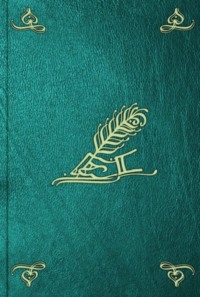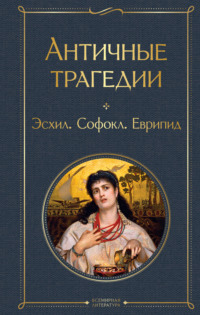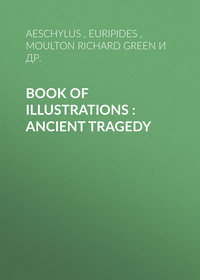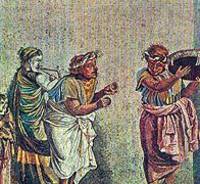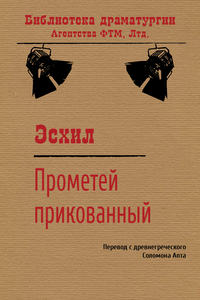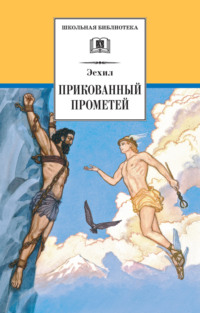Æschylos Tragedies and Fragments
 полная версия
полная версияÆschylos Tragedies and Fragments
Настройки чтения
Размер шрифта
Высота строк
Поля
RHYMED CHORUSES
AGAMEMNON
Verses 40-248Nine weary years are gone and spentSince Menelaos' armamentSped forth, on work of vengeance bent,For Priam's guilty land;And with him Agamemnon thereThrone, sceptre, army all did share;And so from Zeus the Atreidæ bear,Their twofold high command.They a fleet of thousand sail,Strong in battle to prevail,Led from out our Argive coast,Shouting war-cries to the host;E'en as vultures do that utterShrillest screams as round they flutter,Grieving for their nestlings lost,Plying still their oary wingsIn many lonely wanderings,Robbed of all the sweet unrestThat bound them to their young ones' nest.And One on high of solemn state,Apollo, Pan, or Zeus the great,When he hears that shrill wild cryOf his clients in the sky,On them, the godless who offend,Erinnys slow and sure doth send.So 'gainst Alexandros thenThe sons of Atreus, chiefs of men,Zeus sent to work his high behest,True guardian of the host and guest.He, for bride of many a groom,On Danai, Troïans sendeth doom,Many wrestlings, sinew-tryingOf the knee in dust down-lying,Many a spear-shaft snapt asunderIn the prelude of war's thunder.What shall be, shall, and still we seeFulfilled is destiny's decree.Nor by tears in secret shed,Nor by offerings o'er the dead,Will he soothe God's vengeful ireFor altar hearths despoiled of fire.And we with age outworn and spentAre left behind that armament,With head upon our staff low bent.Weak our strength like that of boy;Youth's life-blood, in its bounding joy,For deeds of might is like to age,And knows not yet war's heritage:And the man whom many a yearHath bowed in withered age and sere,As with three feet creepeth on,Like phantom form of day-dream goneNot stronger than his infant son.And now, O Queen, who tak'st thy nameFrom Tyndareus of ancient fame,Our Clytæmnestra whom we ownAs rightly sharing Argos' throne!What tidings joyous hast thou heard,Token true or flattering word,That thou send'st to every shrineSolemn pomp in stately line, —Shrines of Gods who reign in light,Or those who dwell in central night,Who in Heaven for aye abide,Or o'er the Agora preside.Lo, thy gifts on altars blaze,And here and there through heaven's wide waysThe torches fling their fiery rays,Fed by soft and suasive spellOf the clear oil, flowing wellFrom the royal treasure-cell.Telling what of this thou may,All that's meet to us to say,Do thou our haunting cares allay,Cares which now bring sore distress,While now bright hope, with power to bless,From out the sacrifice appears,And wardeth off our restless fears,The boding sense of coming fate,That makes the spirit desolate.Strophe IYes, it is mine to tellWhat omens to our leaders then befell,Giving new strength for war,(For still though travelled farIn life, by God's great gift to us belongThe suasive powers of song,)To tell how those who bearO'er all Achæans sway in equal share,Ruling in one accordThe youth of Hellas that own each as lord,Were sent with mighty hostBy mighty birds against the Troïan coast,Kings of the air to kings of men appearingNear to the palace, on the right hand veering;On spot seen far and near,They with their talons tearA pregnant hare with all her unborn young,All her life's course in death's deep darkness flung.Oh raise the bitter cry, the bitter wail;Yet pray that good prevail!Antistrophe IAnd then the host's wise seerStood gazing on the Atreidæ standing near,Of diverse mood, and knewThose who the poor hare slew,And those who led the host with shield and spear,And spake his omens clear:“One day this host shall go,And Priam's city in the dust lay low,And all the kine and sheepCountless, which they before their high towers keep,Fate shall with might destroy:Only take heed that no curse mar your joy,Nor blunt the edge of curb that Troïa waiteth,Smitten too soon, for Artemis still hatethThe wingèd hounds that ownHer father on his throne,Who slay the mother with the young unborn,And looks upon the eagle's feast with scorn.Ah! raise the bitter cry, the bitter wail;Yet pray that good prevail.EpodeFor she, the Fair One, though her mercy shieldsThe lion's whelps, like dew-drops newly shed,And yeanling young of beasts that roam the fields,Yet prays her sire fulfil these omens dread,The good, the evil too.And now I call on him, our Healer true,Lest she upon the Danai send delaysThat keep our ships through many weary days,Urging a new strange rite,Unblest alike by man and God's high law,Evil close clinging, working sore despite,Marring a wife's true awe.For still there lies in wait,Fearful and ever new,Watching the hour its eager thirst to sate,Vengeance on those who helpless infants slew.”Such things, ill mixed with good, great Calchas spake,As destined by the birds' strange auguries;And we too now our echoing answer makeIn loud and woeful cries:Oh raise the bitter cry, the bitter wail;Yet pray that good prevail.Strophe IIO Zeus, whoe'er Thou be,If that name please thee well,By that I call on Thee;For weighing all things else I fail to tellOf any name but Zeus;If once for all I seekOf all my haunting, troubled thoughts a truce,That name I still must speak.Antistrophe IIFor He who once was great,Full of the might to war,Hath lost his high estate;And He who followed now is driven afar,Meeting his Master too:But if one humbly payWith 'bated breath to Zeus his honour due,He walks in wisdom's way, —Strophe IIITo Zeus, who men in wisdom's path doth train,Who to our mortal raceHath given the fixèd law that pain is gain;For still through his high graceTrue counsel falleth on the heart like dew,In deep sleep of the night,The boding thoughts that out of ill deeds grew;This too They work who sit enthronèd in their might.Antistrophe IIIAnd then the elder leader of great fameWho ruled the Achæans' ships,Not bold enough a holy seer to blameWith words from reckless lips,But tempered to the fate that on him fell; —And when the host was vexedWith tarryings long, scant stores, and surging swell,Chalkis still far off seen, and baffled hopes perplexed;Strophe IVAnd stormy blasts that down from Strymon sweep,And breed sore famine with the long delay,Hurl forth our men upon the homeless deepOn many a wandering way,Sparing nor ships, nor ropes, nor sailing gear,Doubling the weary months, and vexing stillThe Argive host with fear.Then when as mightier charm for that dread ill,Hard for our ships to bear,From the seer's lips did “Artemis” resound,The Atreidæ smote their staves upon the ground,And with no power to check, shed many a bitter tear.Antistrophe IVAnd then the elder of the chiefs thus cried:“Great woe it is the Gods to disobey;Great woe if I my child, my home's fond pride,With my own hands must slay,Polluting with the streams of maiden's bloodA father's hands, the holy altar near.Which course hath least of good?How can I loss of ships and comrades bear?Right well may men desire,With craving strong, the blood of maiden pureAs charm to lull the winds and calm ensure;Ah, may there come the good to which our hopes aspire!”Strophe VThen, when he his spirit proudTo the yoke of doom had bowed,While the blasts of altered moodO'er his soul swept like a flood,Reckless, godless and unblest;Thence new thoughts upon him pressed,Thoughts of evil, frenzied daring,(Still doth passion, base guile sharing,Mother of all evil, holdThe power to make men bad and bold,)And he brought himself to slayHis daughter, as on solemn day,Victim slain the ship to save,When for false wife fought the brave.Antistrophe VAll her cries and loud acclaim,Calling on her father's name, —All her beauty fresh and fair,They heeded not in their despair,Their eager lust for conflict there.And her sire the attendants badeTo lift her, when the prayer was said,Above the altar like a kid,Her face and form in thick veil hid;Yea, with ruthless heart and bold,O'er her gracious lips to holdTheir watch, and with the gag's dumb painFrom evil-boding words restrain.Strophe VIAnd then upon the groundPouring the golden streams of saffron veil,She cast a glance aroundThat told its piteous tale,At each of those who stood prepared to slay,Fair as the form by skilful artist drawn,And wishing, all in vain, her thoughts to say;For oft of old in maiden youth's first dawn,Within her father's hall,Her voice to song did call,To chant the praises of her sire's high state,His fame, thrice blest of Heaven, to celebrate.What then ensued mine eyesSaw not, nor may I tell, but not in vainThe arts of Calchas wise;For justice sends again,The lesson “pain is gain” for them to learn:But for our piteous fate since help is none,With voice that bids “Good-bye,” we from it turnEre yet it come, and this is all as oneWith weeping ere the hour,For soon will come in powerTo-morrow's dawn, and good luck with it come!So speaks the guardian of this Apian home.Verses 346-471O great and sovran Zeus, O Night,Great in glory, great in might,Who round Troïa's towers hast set,Enclosing all, thy close-meshed net,So that neither small nor greatCan o'erleap the bondslave's fate,Or woe that maketh desolate;Zeus, the God of host and guest,Worker of all this confessed,He by me shall still be blest.Long since, 'gainst Alexandros HeTook aim with bow that none may flee,That so his arrows onward driven,Nor miss their mark, nor pierce the heaven.Strophe IYes, they lie smitten low,If so one dare to speak, by stroke of Zeus;Well one may trace the blow;The doom that He decreed their soul subdues.And though there be that sayThe Gods for mortal men care not at all,Though they with reckless feet tread holiest way,These none will godly call.Now is it to the children's children clearOf those who, overbold,More than was meet, breathed Discord's spirit drear;While yet their houses all rich store did holdBeyond the perfect mean.Ah! may my lot be free from all that harms,My soul may nothing weanFrom calm contentment with her tranquil charms;For nought is there in wealthThat serves as bulwark 'gainst the subtle stealthOf Destiny and Doom,For one who, in the pride of wanton mood,Spurns the great altar of the Right and Good.Antistrophe IYea, a strange impulse wildUrges him on, resistless in its might,Atè's far-scheming child.It knows no healing, is not hid in night,That mischief lurid, dark;Like bronze that will not stand the test of wear,A tarnished blackness in its hue we mark;And like a boy who doth a bird pursueSwift-floating on the wing,He to his country hopeless woe doth bring;And no God hears their prayer,But sendeth down the unrighteous to despair,Whose hands are stained with sin.So was it Paris cameHis entrance to the Atreidæ's home to win,And brought its queen to shame,To shame that brand indelible hath setUpon the board where host and guest were met.Strophe IIAnd leaving to her countrymen to bearWild whirl of ships of war and shield and spear,And bringing as her dower,Death's doom to Ilion's tower,She hath passed quickly through the palace gate,Daring what none should dare;And lo! the minstrel seers bewail the fateThat home must henceforth share;“Woe for the kingly house and for its lord;Woe for the marriage-bed and paths which stillA vanished love doth fill!There stands he, wronged, yet speaking not a wordOf scorn from wrathful will,Seeing with utter woe that he is left,Of her fair form bereft;And in his yearning loveFor her who now is far beyond the sea,A phantom queen through all the house shall rove;And all the joy doth fleeThe sculptured forms of beauty once did give;And in the penury of eyes that live,All Aphroditè's graceIs lost in empty space.Antistrophe IIAnd spectral forms in visions of the nightCome, bringing sorrow with their vain delight:For vain it is when oneThinks that great joy is near,And, passing through his hands, the dream is goneOn gliding wings, that bearThe vision far away on paths of sleep.”Such woes were felt at homeUpon the sacred altar of the hearth,And worse than these remain for those who roamFrom Hellas' parent earth:In every house, in number measureless,Is seen a sore distress:Yea, sorrows pierce the heart:For those who from his home he saw departEach knoweth all too well;And now, instead of warrior's living frame,There cometh to the home where each did dwellThe scanty ashes, relics of the flame,The urns of bronze that keepThe dust of those that sleep.Strophe IIIFor Ares, who from bodies of the slainReapeth a golden gain,And holdeth, like a trafficker, his scales,E'en where the torrent rush of war prevails,From Ilion homeward sendsBut little dust, yet burden sore for friends,O'er which, smooth-lying in the brazen urn,They sadly weep and mourn,Now for this man as foremost in the strife,And now for that who in the battle fell,Slain for another's wife.And muttered curses some in secret tell,And jealous discontentAgainst the Atreidæ who as champions ledThe mighty armament;And some around the wall, the goodly dead,Have there in alien land their monument,And in the soil of foesTake in the sleep of death their last repose.Antistrophe IIIAnd lo! the murmurs which our country fillAre as a solemn curse,And boding anxious fear expecteth stillTo hear of evil worse.Not blind the Gods, but giving fullest heedTo those who cause a nation's wounds to bleed;And the dark-robed Erinnyes in due timeBy adverse chance and changePlunge him who prospers though defiled by crimeIn deepest gloom, and through its formless rangeNo gleams of help appear.O'er-vaunted glory is a perilous thing;For on it Zeus, whose glance fills all with fear,His thunderbolts doth fling.That fortune fair I praiseThat rouseth not the Gods to jealousy.May I ne'er tread the devastator's ways,Nor as a prisoner seeMy life wear out in drear captivity!EpodeAnd now at bidding of the courier-flame,Herald of great good news,A murmur swift through all the city came;But whether it with truth its course pursues,Who knows? or whether God who dwells on high,With it hath sent a lie?Who is so childish, or of sense bereft,As first to feel the glowThat message of the herald fire has left,And then to sink down low,Because the rumour changes in its sound?It is a woman's moodTo accept a boon before the truth is found:Too quickly she believes in tidings good,And so the line exactThat marks the truth of factIs over-passed, and with quick doom of deathA rumour spread by woman perisheth.Verses 665-782Strophe IWho was it named her with such foresight clear?Could it be One of might,In strange prevision of her work of fear,Guiding the tongue aright?Who gave that war-wed, strife-upstirring oneThe name of Helen, ominous of ill?For 'twas through her that Hellas was undone,That woes from Hell men, ships, and cities fill.Out from the curtains, gorgeous in their fold,Wafted by breeze of Zephyr, earth's strong child,She her swift way doth hold;And hosts of mighty men, as hunters boldThat bear the spear and shield,Wait on the track of those who steered their wayUnseen where Simois flows by leafy field,Urged by a strife that came with power to slay.Antistrophe IAnd so the wrath which doth its work fulfilTo Ilion brought, well-named,A marriage marring all, avenging stillFor friendship wronged and shamed,And outrage foul on Zeus, of host and guestThe guardian God, from those who then did raiseThe bridal hymn of marriage-feast unblestWhich called the bridegroom's kin to shouts of praise.But now by woe oppressedPriam's ancient city waileth very sore,And calls on Paris unto dark doom wed,Suffering yet more and moreFor all the blood of heroes vainly shed,And bearing through the long protracted yearsA life of wailing grief and bitter tears.Strophe IIOne was there who did rearA lion's whelp within his home to dwell,A monster waking fear,Weaned from the mother's milk it loved so well:Then in life's dawning light,Loved by the children, petted by the old,Oft in his arms clasped tight,As one an infant newly-born would hold,With eye that gleamed beneath the fondling hand,And fawning as at hunger's strong command.Antistrophe IIBut soon of age full grown,It showed the inbred nature of its sire,And wrought unasked, alone,A feast to be that fostering nurture's hire;Gorged full with slaughtered sheep,The house was stained with blood as with a curseNo slaves away could keep,A murderous mischief waxing worse and worse,Sent as from God a priest from Atè fell,And reared within the man's own house to dwell.Strophe IIISo I would say to Ilion then there cameMood as of calm when every wind is still,The gentle pride and joy of noble fame,The eye's soft glance that all the soul doth thrill;Love's full-blown flower that bringsThe thorn that wounds and stings;And yet she turned aside,And of the marriage feast wrought bitter end,Coming to dwell where Priam's sons abide,Ill sojourner, ill friend,Sent by great Zeus, the God of host and guest,A true Erinnys, by all wives unblest.Antistrophe IIIThere lives a saying framed of ancient days,And in men's minds imprinted firm and fast,That great good fortune never childless stays,But brings forth issue, – that on fame at lastThere rushes on apaceGreat woe for all the race;But I, apart, alone,Hold a far other and a worthier creed:The impious act is by ill issue known,Most like the parent deed;While still for all who love the Truth and Right,Good fortune prospers, fairer and more bright.Strophe IVBut wanton Outrage done in days of oldAnother wanton Outrage still doth bear,And mocks at human woes with scorn o'erbold,Or soon or late as they their fortune share.That other in its turnBegets Satiety,And lawless Might that doth all hindrance spurn,And sacred right defy,Two Atès fell within their dwelling-place,Like to their parent race.Antistrophe IVYet Justice still shines bright in dwellings murkAnd dim with smoke, and honours calm content;But gold-bespangled homes, where guilt doth lurk,She leaves with glance in horror backward bent,And draws with reverent fearTo places holier far,And little recks the praise the prosperous hear,Whose glories tarnished are;But still towards its destined goal she bringsThe whole wide course of things.Say then, son of Atreus, thouWho com'st as Troïa's conqueror now,What form of welcome right and meet,What homage thy approach to greet,Shall I now use in measure true,Nor more nor less than that is due?Many men there are, I wis,Who in seeming place their bliss,Caring less for that which is.If one suffers, then their wailLoudly doth the ear assail;Yet have they nor lot nor partIn the grief that stirs the heart;So too the joyous men will greetWith smileless faces counterfeit:But shepherd who his own sheep knowsWill scan the lips that fawn and gloze,Ready still to praise and blessWith weak and watery kindliness.Thou when thou the host did'st guideFor Helen – truth I will not hide —In mine eyes had'st features grim,Such as unskilled art doth limn,Not guiding well the helm of thought,And giving souls with grief o'erwroughtFalse courage from fresh victims brought,But with nought of surface zeal,Now full glad of heart I feel,And hail thy acts as deeds well done:Thou too in time shall know each one,And learn who wrongly, who arightIn house or city dwells in might.Verses 947-1001Strophe IWhy thus continuallyDo ever-haunting phantoms hover nighMy hearth that bodeth ill?Why doth the prophet's strain unbidden still,Unbought, flow on and on?Why on my mind's dear throneHath faith lost all her former power to flingThat terror from me as an idle thing?Yet since the ropes were fastened in the sandThat moored the ships to land,When the great naval host to Ilion went,Time hath passed on to feeble age and spent.Antistrophe IAnd now as face to face,Myself reporting to myself I traceTheir safe return; and yetMy mind, taught by itself, cannot forgetErinnys' dolorous cry,That lyreless melody,And hath no strength of wonted confidence.Not vain these pulses of the inward sense,As my heart beateth in its wild unrest,Within true-boding breast;And hoping against hope, I yet will prayMy fears may all prove false and pass away.Strophe IIOf high, o'erflowing healthThere is no limit found that satisfies;For soon by force or stealth,As foe 'gainst whom but one poor wall doth rise,Disease upon it presses, and the lotOf fair good fortune onward moves untilIt strikes on unseen reef where help is not.But should fear move their willFor safety of their freight,With measured sling a part they sacrifice,And so avert their fate,Lest the whole house should sink no more to rise,O'erwhelmed with misery;Nor does the good ship perish utterly:So too abundant gift,From Zeus in double plenty, from the earth,Doth the worn soul from anxious care uplift,And turns the famished wail to bounding joy and mirth.Antistrophe IIBut blood that once is shedIn purple stream of death upon the ground,Who then, when life is fled,A charm to call it back again hath found?Else against him who raised the dead to lifeZeus had not sternly warred, as warning givenTo all men; but if Fate were not at strifeWith Fate that brings from HeavenHelp from the Gods, my heart,Out-stripping speech, had given thought free vent.But now in gloom apartIt sits and moans in sullen discontent,And hath no hope that e'erIt shall an issue seasonably fairFrom out the tangled skeinOf life's strange course unravel straight and clear,While in the fever of continuing painMy soul doth burden sore of troublous anguish bear.THE LIBATION-POURERS
Verses 20-75Strophe ILo, from the palace doorWe wend our way to pourGifts on the dead;And in our bitter woe,Our hands with many a blowSmite breast and head.On each fair cheek the nailHas ploughed full many a trail,And all to tatters tornThe garments we have worn;The foldings of the vestO'er maiden's swelling breastAre roughly rent;For now on us the chanceThat shuts out joy and danceOur fate hath sent.Antistrophe IA spectral vision clearThrills every hair with fear,In haunted sleep,Breathing of dire distress,From innermost recessIts watch doth keep,Breaking with cry of frightThe still deep hush of night:All through the queenly bowerSharp cry was heard that hour,And they to whom 'twas givenTo read decrees of Heaven,In dream o'er-true,By solemn pledges bound,Declared that undergroundThe dead were wrathful found'Gainst those that slew.Strophe IIAnd so the godless queenIn eager haste is seen, —Sends me with gifts like this,Full graceless grace, I wis,As if (O mother Earth,To whom we owe our birth!)To banish dread.And I would fain delayThis prayer of mine to pray:What ransom can men payFor blood once shed?Oh, hearth and home of woe!Oh, utter overthrow!Foul mists brood o'er our halls:No ray of sunlight falls;Thick darkness from the tombOf heroes makes the gloomYet more intense.Antistrophe IIAnd awe that once we knew,Strong, mighty to subdue,Falling on every ear,Thrilling each soul with fear,Is gone far hence.There be that well may bowIn craven terror now,For lo! Success enthronedAs more than God is owned.But Vengeance will not failEre long to turn the scale.On some her strokes alight,While yet their day is bright;Some, as in twilight's gloom,O'erflow with gathering doom;Some endless night doth holdIn realm of darkness old.Strophe IIIAnd for the blood which Earth,To whom it owed its birth,Hath drunk, there still doth waitA stern avenging Fate;The stain of blood doth stay,And will not pass away,And nerves are thrilled with painIn soul that sets in trainThe plague that works amainIts evil great.Antistrophe IIIAll help from him hath fledWho with adulterous treadDenies another's bed.Though many streams should pourTheir waters o'er and o'er,Those waters evermoreAre poured in vain;They cannot cleanse the guiltOf blood that once is spilt,Man's hand to stain.EpodeBut since to me by HeavenThe exile's life is given,(Yea, far from home I knowThe bondslave's cup of woe,)I needs must yield assentTo good or ill intent,Accepting their commandsWho rule with sceptred hands, —Yea, I must hide my hateIn this my evil fate,And under strong controlKeep my rebellious soul;And now beneath my veilI weep my woes' full tale;For cares that vex and fretMy cheeks with tears are wet.Verses 576-639Strophe IMany dread forms of woe and fear the EarthDoth breed; and Ocean's deepIs full of foes men hate, of monstrous birth;And Air's high pathways keepTheir flashing meteors; birds that wing their flight,And things on earth that creep;And one might tell the wrath of whirlwind's might,When tempests wildly sweep.Antistrophe IBut who can tell man's purpose overbold?Or woman's, prompt to dare?Or the strong loves that men in bondage hold,And bring woe everywhere?Or strange conjunctions of the hearth and home?But still the palm they bear,The loves unloved that women overcome,And hold dominion there.Strophe IIAnd one whose thoughts are not o'erswift of wing,May learn and ponder wellWhat purpose Thestios' child to act did bring,Purpose most dire and fell,Her burning thought who did her own child slay,Kindling the torch of deathThat with her child's life kept its equal way,Since coming from his mother's womb he cried,To that predestined day on which at last he died.Antistrophe IIAnd yet another must I in my songDevote to hate and scorn,The murderess Skylla, who to deeds of wrongBy Minos' gifts was borne,And for her foes' sake slew a man she lovedFor Cretan chains gold-wrought;She with dog's heart the deathless lock removedFrom him, in deep sleep sunk; yet Hermes' powerShe too was taught at last at her appointed hour.Strophe IIIBut since I tell my tale of loathly crime,And of ill-omened marriage out of time,Wedlock our house abhors,The schemes and plots of women steeped in guileAgainst a warrior chief, a chief erewhileThe dread of foes in wars,The foremost place I give to altar-hearthWhere no wrath burns and woman knows the worthOf mood from daring free.Antistrophe IIIYet of all ills the Lemnian first may stand,The cry of loathing rings through all the land,And still each crime of dreadA man will liken to the Lemnian ill;And now by woe that comes from God's stern willThe race is gone and fled,Of all men scorned, for no man looks with loveOn deeds that to the high Gods hateful prove;Is not this clear to see?Strophe IVAnd lo! the sword sharp-pointed pierces deep,E'en to the heart, the sword which Vengeance wields;The lawless deed will not neglected sleep,When men tread down what fear of high heaven shields;Antistrophe IVBut still the block of Vengeance firm doth stand,And Fate, as swordsmith, hammers blow on blow;And then with thoughts that none can understand,Erinnys comes far known, though working slow,And to the old house brings the youthful heir,That deeds of blood wrought out of olden timeMay the due judgment bearFor each polluting crime.Verses 769-820Strophe IOh, hear me, hear my prayer, thou mighty Lord!Sire of all Gods that on Olympos dwell,Hear Thou, and grant my longing heart's desire,That those who wise of heart would fain do wellMay see each prayer for rightFulfilled in holiest might;That prayer, O Zeus, I pray.Strophe IIDo Thou protect him, yea, O Zeus, and bringBefore his foes on yonder secret way;For if thou raise him high, then Thou, O king,Shalt to thy heart's contentReceive a twofold, threefold recompence,For that thine anger bentAgainst each old offence.Antistrophe ILook on the son of one whom Thou did'st love,Like orphan colt fast bound to car of woes;Set Thou a mark that may as limit prove;Ah, might one watch his footsteps as he goes,In measured course and true,This his own country through!Strophe IIIAnd ye who in our homeStand in the shrine with plenteous wealth full stored,Hear, O ye Gods, and come,Yea, come with one accord,Lead him on, wash awayWith vengeance new the blood of crime of old;Let not the old guilt stayTo breed fresh offspring where our home we hold.MesodeBut grant him good success,O Thou who dost within the great cave dwell!With upward glance of joy our chief's house bless,And that he too, full well,Freely and brightly with the dear, loved eyes,May look from out the veil of cloudy skies.Antistrophe IIIAnd then may Maia's sonAssist him, as is meet, in this his task!Through Him success is won,The boon that now we ask:And many secret things will He make clear,If that should be His will;But should He choose the truth should not appear,Before men's eyes He stillBrings darkness and the blackness of the night,Nor is He clearer in the day's full light.Strophe IVAnd then will we pour forthAll that our house contains of costliest worth,Past evil to redeem,And through the city we will raise the strainShrill-voiced of women's chant yet once again.All this as good I deem;This, this my gain increaseth more and more,And far from those I love is sorrow's bitter stour.Antistrophe IIBut thou, take courage when the time is come,The time to act indeed,And when she calls thee “child,” do thou strike home,And let thy father's name for vengeance plead;Do thy dread taskwork to the uttermost.Antistrophe IVLet Perseus' heart within thy bosom dwell,For thou dost work for each dear kindred ghost,And those on high, a bitter boon and fell,Completing there withinThe deed of blood and sin,And utterly destroying him whose handThat crime of murder planned.

